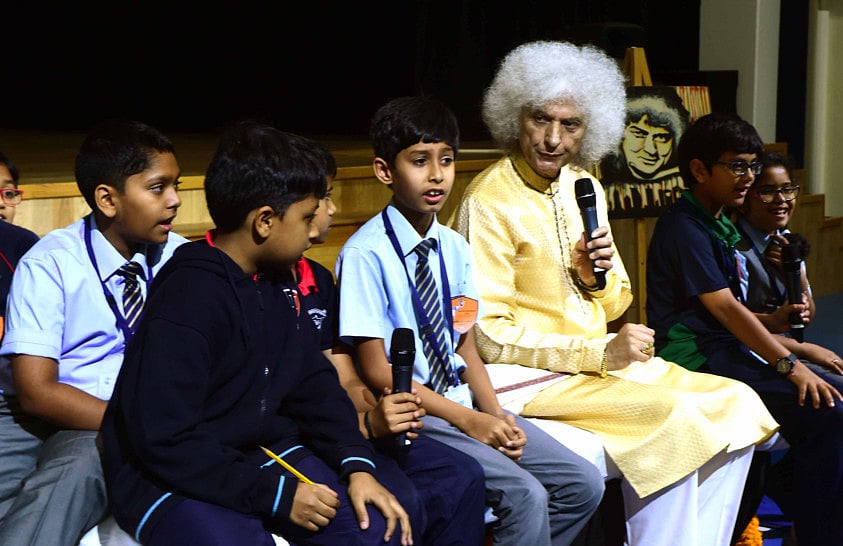Dubai: In a stimulating, one-hour session held at the Gems Heritage Indian School Thursday, India’s celebrated music maestro, Pandit Shiv Kumar Sharma, interacted with students from grade 1-5.
The santoor (a string instrument) maestro taught students the importance of rhythm by actually singing extempore, leading to lively interactions between the musician and his young audience.
Emphasising on the impact of music on the human mind, Pt Sharma told the students: “The human body is full of rhythm and sound; we walk in a rhythm, our heart beats to a rhythm and when we cover our eyes and ears and listen, we can hear the sounds within.”
Speaking to students about music’s ability to destress and rejuvenate the mind, Pt Sharma said, “Making music an intrinsic part of your life is the best way to enjoy it.”
The students were motivated to enjoy active exercises in music and rhythm.
Jogiraj Sikidar, founder and director of Malhar Centre of Performing Arts (MCPA), who along with his team is teaching the music curriculum at the school, said: “We are training students in Indian classical performing arts based on the principles of ‘Listen, Learn and Perform’ where students will learn these art forms from their gurus, listen from maestros and then perform in front of an audience.”
Learning Indian performing arts was not only an engaging activity for students but was also aimed at helping develop focus, self-esteem, boost confidence and impart life skills, Sikidar said. It also has the potential to improve academic performance, he added.
Darryl Bloud, executive principal and vice-president of Indian School at Gems, said: ‘While most schools have music as an after-school activity, we have integrated it in the curriculum. Usually schools offer Western music but we decided on Indian classical music.”
Pt Sharma will be giving a santoor recital at the Dubai Opera on Friday evening (February 8).
Who is Pandit Shiv Kumar Sharma?
Pandit Shiv Kumar Sharma, 80, is accorded the credit of transforming the santoor, a humble folk string instrument, into a popular classical instrument.
Traditionally, the santoor is a 100-string instrument, used as an accompanying instrument by the folk and Sufi singers of Jammu and Kashmir. But Pandit Sharma experimented with it, added an additional 16 strings and transformed it into a solo concert instrument.
Belonging to the state of Jammu and Kashmir, Pandit Sharma was groomed in the best traditions of Hindustani Classical music under the tutelage of his father Pandit Uma Dutt Sharma.
The recipient of India’s second-highest civilian award of Padma Vibhushan, Pandit Sharma is both an instrumentalist and a music composer and has earned several accolades for this dedication to the cause of music.
Sign up for the Daily Briefing
Get the latest news and updates straight to your inbox
Network Links
GN StoreDownload our app
© Al Nisr Publishing LLC 2026. All rights reserved.
